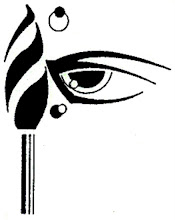"Art is Business" Expo Chicago Jon Witzky and Jam Lovell Articles
This is not necessarily a bad thing, as is evidenced by pieces such as Daniel Buren’s “Situated works” Buren’s pieces are light-based works made of optical fiber, and their ubiquitous presence dominated the fair as they worked to transform the architecture into a deeply immersive atmosphere, equally jarring and meditative.
Water Light Graffiti is another light-based interactive work by the Paris-based artist Antonin Fourneau. Created with 1000’s water-sensitive LED light bulbs, the public was invited to participate in an ever-evolving graffiti-inspired piece, like a grown-up version of lite-brite with a twist; the addition and erasure of light created through the use of damp sponges. Sponsored by the Natural Resources Defense Council, Fourneau’s work hopes to spark a dialogue about the interplay between technology and nature and our dwindling resources.
This is not necessarily a bad thing as is evidenced by pieces such as Daniel Buren’s “Situated works,” Buren’s pieces are light-based works made of optical fiber and their ubiquitous presence dominated the fair as they worked to transform the architecture into a deeply immersive atmosphere, equally jarring and meditative.
Water Light
Graffiti is another light-based interactive work by the Paris-based artist
Antonin Fourneau. Created with 1000’s water-sensitive LED light bulbs, the
public was invited to participate in an ever-evolving graffiti-inspired piece.
Like a grown-up version of lite-brite with a twist, the addition and erasure of
light are created by using damp sponges. Sponsored by the Natural
Resources Defense Council, Fourneau’s work hopes to spark a dialogue about the
interplay between technology and nature and our dwindling resources.
The piece seduces the audience with its shiny red finish and attracts viewers like flies to light with its slow, fluid motion. After being drawn to the sculpture, the viewer patiently waits for the piece to stagnate, but due to the weight distribution between aluminum, brass, and stainless steel, Lotus 0.475 never quits. In a world where abstract and figural sculpture reigns supreme, it is a breath of fresh air to witness such a carefully planned and crafted piece focusing primarily on kinetics.
This year's Expo marks the first official collaboration between Expo Chicago and China and features four artists represented by CAFA, the Central Academy of Fine Arts in Beijing. The highlights of this group were Geng Xue and Wang Yuping. In Mr. Sea, Geng Xue creates delicate porcelain sculptures as well as stop-motion films with these creations. The effect is stunning, bringing the ancient artisanal tradition of porcelain wares into a thoroughly modern sculptural and cinematic realm.
Wang Yuping works with acrylic on paper to create a series of discrete and whimsical images titled, appropriately enough, Small Things. These paintings feature familiar and unfamiliar objects centered on an off-white background and comment on production and conspicuous consumption.
While embracing its function as an art fair, Expo Chicago secondarily serves as an educational environment for students, faculty, and art lovers. Unlike other art fairs such as Art Prize, Expo primarily exists to serve the buyer's market. Art Prize, located in Grand Rapids, Michigan, celebrates and coming, established, experimental, or filmmakers.
The artists are often present at the event to answer questions and encourage meaningful conversation about the work. Expo Chicago is an international fair showcasing contemporary art from famous, established artists. The artists are not always present at the event. Typically only the dealers that represent them are available and have little time for the non-buyer. Expo sparks conversation among visitors during an event such as Art Prize sparks conversation among visitors and artists.
While embracing its function as an art fair,
Expo Chicago secondarily serves as an educational environment for students,
faculty, and art lovers alike. Unlike other art fairs such as Art Prize, Expo
primarily exists to serve the buyer's market. Art Prize, located in Grand
Rapids, Michigan, celebrates and







